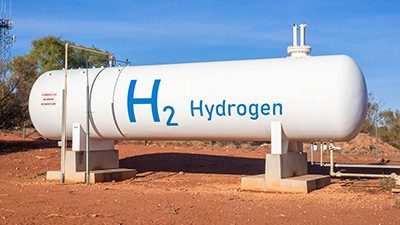FOR IMMEDIATE RELEASE
“Manganese Promoted (Bi)carbonate Hydrogenation and Formate Dehydrogenation: Toward a Circular Carbon and Hydrogen Economy”
ACS Central Science

Hydrogen gas could someday replace fossil fuels as a “clean” energy source, producing only water and energy. However, handling large quantities of gaseous hydrogen is cumbersome, and converting it to a liquid requires vessels that can withstand extremely high pressures. Now, researchers reporting in ACS Central Science have developed a method to store and release highly pure hydrogen with salts in the presence of amino acids.
The reversible storage of hydrogen in solid salts has emerged as one potential way to make the fuel easier to transport and handle, but the reactions to do this require precious metals as catalysts and may produce carbon dioxide as an unwanted byproduct. So, Henrik Junge, Matthias Beller and colleagues developed effective storage-release systems with both bicarbonate and carbonate salts, as well as manganese, which is a more widely available metal catalyst. The researchers found that converting bicarbonate and hydrogen into formate, and vice versa, was most effective with potassium salts, a manganese-based catalyst and lysine — an amino acid that acted as an additional promoter and reacted with carbon dioxide to capture it — at reaction temperatures below 200 F. After five storage-release cycles, the reaction system produced hydrogen with a high yield (80%) and purity (99%). The team also showed that carbonate salts and glutamic acid can be part of the reusable storage-release system with hydrogen yields up to 94%. This technique paves the way for large-scale hydrogen storage in solids, the researchers say.
The authors acknowledge funding from the State of Mecklenburg-Vorpommern and European Union, the Leibniz-Program Cooperative Excellence K308/2020 (project “SUPREME”) and the European CO2PERATE project.
###
The American Chemical Society (ACS) is a nonprofit organization chartered by the U.S. Congress. ACS’ mission is to advance the broader chemistry enterprise and its practitioners for the benefit of Earth and all its people. The Society is a global leader in promoting excellence in science education and providing access to chemistry-related information and research through its multiple research solutions, peer-reviewed journals, scientific conferences, eBooks and weekly news periodical Chemical & Engineering News. ACS journals are among the most cited, most trusted and most read within the scientific literature; however, ACS itself does not conduct chemical research. As a leader in scientific information solutions, its CAS division partners with global innovators to accelerate breakthroughs by curating, connecting and analyzing the world’s scientific knowledge. ACS’ main offices are in Washington, D.C., and Columbus, Ohio.
To automatically receive press releases from the American Chemical Society, contact newsroom@acs.org.
Note: ACS does not conduct research, but publishes and publicizes peer-reviewed scientific studies.





